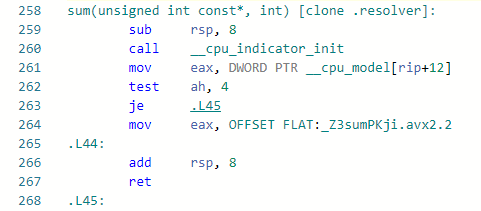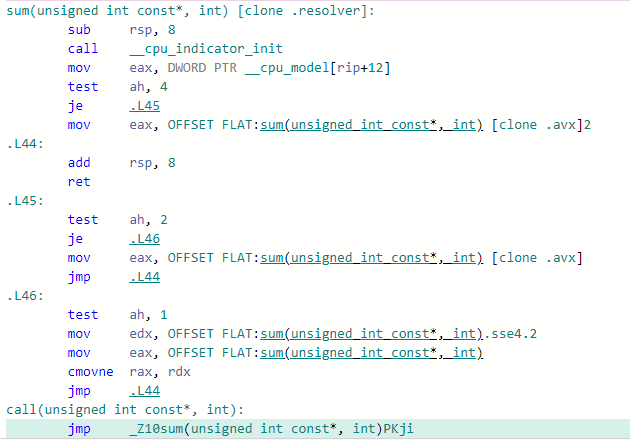Old and new function multi-versioning
I have been touching multi-versioning already in two previous articles: Part I, Part II but I wanted to return to this topic once more (and probably not for the last time). Multi-versioning feature is available in GCC for quite some time, it has appeared in GCC4.8 but went some refinement in GCC6. In this short post, I will show what has changed and how to migrate from old to a new version. New compilers support both versions so migration is optional, although it makes life much easier.

The Old
Multi-versioning was implemented as function attribute, where for every separate specialization, function body had to be explicitely defined. So in case of targeting code to 3 different CPU architectures, function would have to be defined 3 times (default specialization is obligatory in both old and new implementations of multi-versioning and code will not compile when it is missing.):
__attribute__((target("sse4.2")))
uint64_t sum(const uint32_t* val, int size) {
uint64_t result = 0;
for (int i=0; i<size; i++) result += val[i];
return result;
}
__attribute__((target("avx2")))
uint64_t sum(const uint32_t* val, int size) {
uint64_t result = 0;
for (int i=0; i<size; i++) result += val[i];
return result;
}
__attribute__((target("default")))
uint64_t sum(const uint32_t* val, int size) {
uint64_t result = 0;
for (int i=0; i<size; i++) result += val[i];
return result;
}
For short functions this was acceptable (altohugh inconvinient). For longer functions and to reduce code duplication possible workaround was using fully inlined implementation and wrappers for each specialization:
inline __attribute__((always_inline))
uint64_t sumImpl(const uint32_t* val, int size) {
uint64_t result = 0;
for (int i=0; i<size; i++) result += val[i];
return result;
}
__attribute__(target("sse4.2")))
uint64_t sum(const uint32_t* val, int size) {
return sumImpl(val, size);
}
__attribute__(target("avx2")))
uint64_t sum(const uint32_t* val, int size) {
return sumImpl(val, size);
}
__attribute__(target("default")))
uint64_t sum(const uint32_t* val, int size) {
return sumImpl(val, size);
}
Note the use of attribute always_inline! If sumImpl was called instead of being inlined, attribute target would not be applied to its implementation making our efforts completely useless. Multi-versioning is not propagated down the call tree, but it is applied to the unrolled/inlined code.
What is worse, target attribute was also needed on function declaration, which made multi-versioning part of function signature and public API (unless wrapper functions are used). In case of class member functions also inlined “impl” function had to be declared in header:
class Summarization {
public:
__attribute__(target("sse4.2")))
uint64_t sum(const uint32_t* val, int size);
__attribute__(target("avx")))
uint64_t sum(const uint32_t* val, int size);
__attribute__(target("avx2")))
uint64_t sum(const uint32_t* val, int size);
private:
uint64_t sumImpl(const uint32_t* val, int size);
};
Even though it makes this feature inconvenient to apply it was still useful.
The New
GCC6 introduced much needed attribute target_clone which allowed to define multiple targets at once and apply this to single function body. Compiler will do the rest: clone function code and apply different optimizations to each copy:
__attribute__(target_clone("sse4.2", "avx2", "default")))
uint64_t sum(const uint32_t* val, int size) {
uint64_t result = 0;
for (int i=0; i<size; i++) result += val[i];
return result;
}
This greatly reduces the need for code duplication or workarounds using inlined implementations. Additionally, it is not needed (and generally not allowed) to apply the target_clones attribute in the function declaration, making multi-versioning internal implementation detail.
Some details under the hood

Details behind dropping requirement for applying multi-versioning to declarations is quite interesting. It seems that resolver (function that selects and calls proper version of code, based on CPU properties detected in runtime) is now generated under signature of multi-versioned function itself. External code sees only single resolver function and is completely not aware of multi-versioning. As seen in Godbolt new-style multi-versioning generates resolver before function is even used:

For old attribute resolver is generated only when some call is made (link to Godbolt):

Also function name itself is mangled, but not in a standard C++ way, but with some GCC obscure magic. This explains why declaration has to indicate that multi-versioning is taking place: so that compiler can find function name mangled in “special” way.
jmp _Z10sum(unsigned int const*, int)PKji
This probably breaks linking with code from other compilers when the multi-versioned function is exported, but I haven’t checked that.
How-to
As a summary, here are simple steps how to migrate from old to new multi-versioning
- Reduce all copies of multi-versioned function with
targetattribute into one, withtarget_clonesattribute. - Remove all workarounds with an inlined body of a function
- Remove any reference to multi-versioning from function declarations
Update
There was really interesting comment on Reddit from u/erichkeane. Definitely worth reading.
Comments